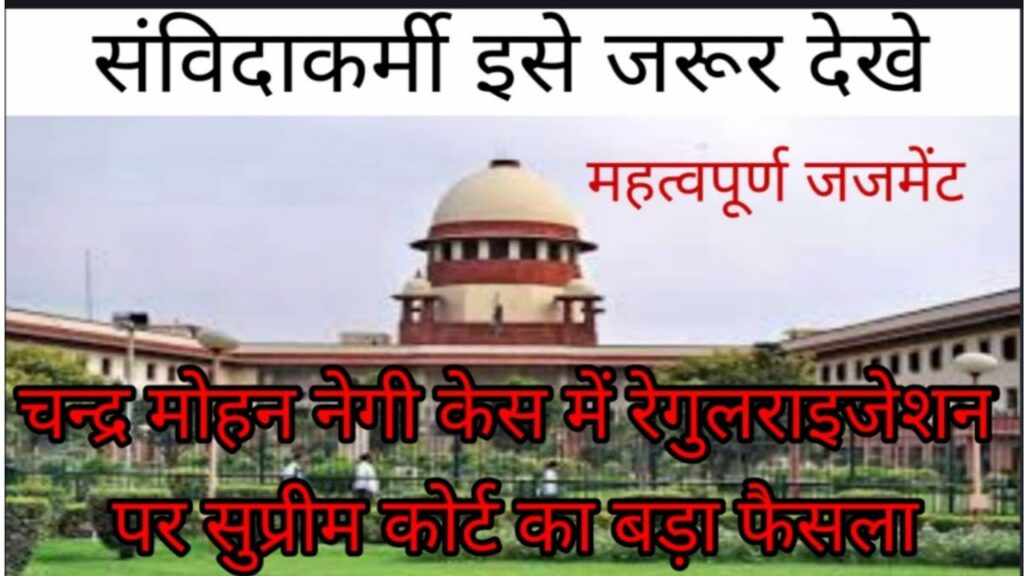Supreme Court Ruling: Equal Application of Regularisation Policies for All Eligible Employees
In a landmark ruling on July 22, the Supreme Court emphasized the importance of equitable application of regularisation policies for eligible employees. Although daily wage employees lack a legally vested right to demand regularisation, the Court asserted that any policy decision made by a competent authority must benefit all eligible individuals equally.
Key Takeaways from the Ruling
- Equitable Application of Policies: Regularisation policies must be applied uniformly to all eligible employees without discrimination.
- Fairness and Transparency: Authorities should ensure that the process of regularisation is fair, transparent, and free from bias.
- Legal Compliance: Decisions regarding regularisation must comply with constitutional provisions, ensuring equality of opportunity for all workers.
- Protection of Employee Rights: The ruling underscores the importance of protecting the rights of employees, particularly those on daily wages, to ensure they receive fair treatment and job security.
Implications for Future Cases
This Supreme Court ruling sets a precedent for future cases involving regularisation policies and employment rights. It reinforces the principle that authorities must act fairly and justly, upholding the rights of all eligible employees to benefit from policy decisions. This decision is a significant step towards ensuring equitable treatment of workers across India, promoting a more just and inclusive workplace environment.
Background of the Case
The case involved a daily wage worker from the Government Kalaniketan Polytechnic College, Jabalpur. A bench comprising Justice Surya Kant and Justice Ujjal Bhuyan upheld the Madhya Pradesh High Court’s directive to regularise the appointment of this employee. The Court highlighted the need for fair implementation of regularisation policies without discrimination.
Understanding Regularisation Policies
Regularisation policies are designed to provide job security and benefits to workers who have been employed on a temporary or daily wage basis for an extended period. However, these policies can be complex, as they often involve criteria and processes that must be followed to ensure fair and equal treatment of all eligible employees.
The Supreme Court’s Observations
The Supreme Court acknowledged that while daily wage employees do not inherently have the right to regularisation, if a policy decision is made, its benefits must be uniformly applied. Authorities cannot arbitrarily select beneficiaries based on personal preference or other biased considerations.
The High Court’s Decision
In the original case, the Madhya Pradesh High Court ruled in favor of Shyam Kumar Yadav, a daily wage worker who had been employed at the Collectorate rate since November 26, 1993. His services were terminated in 1995 but were later reinstated based on a recommendation from the Screening Committee. Despite the state’s claim of reinstatement in 2009, records indicated that Yadav had been working continuously since 2006.
Discrimination in Regularisation
Yadav’s situation highlighted a case of hostile discrimination, where he was denied regularisation despite several junior employees being regularised. The High Court found this discriminatory and ruled in Yadav’s favor, affirming that he was entitled to regularisation based on his long service and eligibility.
Supreme Court’s Stand on the Matter
The Supreme Court upheld the High Court’s decision, rejecting the state’s appeal against the order. The Court scrutinized the affidavits and documents submitted by the petitioner-state and found them vague and misleading. It noted that Yadav had worked continuously as a daily wager from 2005 to 2009, and his eligibility for the position was unquestioned. His initial appointment complied with Articles 14 and 16 of the Constitution, which guarantee equality of opportunity in public employment.
The Importance of Fairness in Regularisation
The Supreme Court emphasized that authorities must extend the benefits of regularisation policies to all eligible employees without bias. The Court underscored the need for a transparent and equitable process to prevent discriminationThe Supreme Court emphasized that authorities must extend the benefits of regularisation policies to all eligible employees without bias. The Court underscored the need for a transparent and equitable process to prevent discrimination and ensure justice for all workers.
Conclusion: Supreme Court’s Directive
In dismissing the state’s special leave petition, the Supreme Court directed the state to grant Yadav all the benefits of regular employment, including arrears of pay and seniority, within three months. This decision serves as a reminder to authorities that regularisation policies must be applied consistently and fairly to all eligible employees, regardless of their status as daily wage workers.

